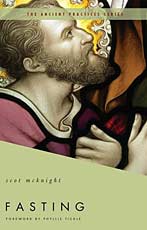"A little more than a year after Hurricane Katrina buckled the knees of the Gulf Coast, I was in New Orleans and saw houses that had a spray-painted grid with numbers of bodies found. Most of the former residents of New Orleans have not returned to their houses, thousands of houses are still standing empty and may never be filled, and many of the schools have not reopened. As Dr. Bill Warren, a professor at New Orleans Baptist Theological Seminary, drove me around some neighborhoods, I was stunned. I felt complicit in this impoverishment because I didn't know how bad it still was. But I was heartened by the efforts of Bill and his colleagues and students and community.
"What should we do? How should we respond when we are confronted by such poverty? The Bible's wisdom reveals that people in tune with God fast in such a situation. They fast in order to become more compassionate. . . . I confess to you that fasting didn't even enter my mind as I wandered through New Orleans.
"Think of Israel's return from exile and the rebuilding of the temple and its walls under the leadership of Ezra and Nehemiah. When Ezra realized how many Israelites had intermarried with Babylonians in overt disobedience to what the Torah taught, he was overcome with grief. Realizing his complicity, Ezra withdrew from the house of God to spend the night alone before God. No moment was more solemn in all of Ezra's life, so he 'did not eat bread or drink water, for he was mourning over the faithlessness of the exiles' (Ezra 10:6). Fasting was Ezra's way of demonstrating his own complicity in Israel's moral wandering, and it was also his way of identifying with his fellow wanderers from God in order to lift them before the God of mercy. In other words, fasting was Ezra's way of identifying with God's will for God's people. . . . His fasting was not done to get something but to respond to a grievous situation.
"Many of us are moved emotionally by the realization of needs and our complicity in poverty, but we are far too often more moved emotionally than we are moved to do something about it. Fasting might be the best way for many of us to seal the moment; fasting for a day might be what we most need to change our own pathetic passivity in the face of famine. It might be the way for each of us to bring our entire person in line with the heart God has for the poor."
